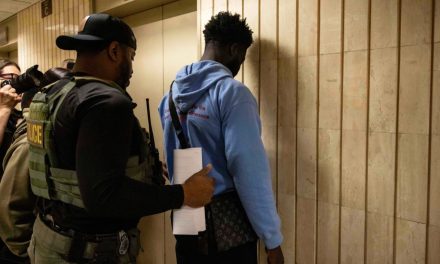By Warren Kulo
A former Mobile postal worker admitted in federal court Tuesday to participating in a conspiracy which resulted in the theft of nearly $18 million in business checks sent through the mail, according to court documents.
Kalaijha Lewis, employed as a clerk at the post office on Saint Joseph Street in Mobile, stole checks she identified as business checks and then sold batches of those checks to Brian Christopher Williams III, who in exchange paid Lewis $2,000 to $3,000 for each batch.
Both Lewis and Williams admitted to their roles in the conspiracy as part of a plea agreement with federal prosecutors. In exchange for their guilty pleas, prosecutors agreed to recommend a lesser sentence than the 30-year maximum sentence allowed under federal sentencing guidelines.
Court documents show Lewis, who began her employment with the U.S. Postal Service in 2015, initially admitted to stealing checks and selling them to Williams over a three-month period in 2023, but investigators discovered evidence on both Lewis’ and Williams’ cell phones of the conspiracy dating back to November 2021, to which Lewis admitted in her guilty plea Tuesday.
Once Lewis turned over stolen checks to Williams, he then sold them via other coconspirators using an encrypted messaging platform called Telegram. In some cases, coconspirators made fraudulent deposits and withdrawals with the checks themselves rather than sell them through Telegram, according to court records.
In January 2023, several Mobile-area businesses complained to the postal service that checks they had mailed through the Saint Joseph Street location, or had expected to receive there, had never arrived at their destination.
In court documents, prosecutors laid out examples of the conspiracy:
- In February, a Mobile maritime business expected to receive a check from a vendor for $39,915.74, but the check never arrived. Investigators determined the check was stolen, counterfeited, and deposited at face value into the bank account of an unauthorized payee.
- The following month, a Mobile contractor mailed a check for $58,184.39 to a local law firm via its P.O. box at Saint Joseph Street. The check was never received. Instead, it was also stolen, counterfeited and deposited into a bank account of an unauthorized payee.
Dozens of similar incidents were reported by businesses, primarily in the Mobile area.
Those complaints launched an investigation at the Saint Joseph Street location in June, with surveillance conducted on the workroom floor and the area of the P.O. boxes.
On June 12, agents saw Lewis, while sorting mail, manipulating the envelope windows with checks inside in order to see the amount of the checks. Cell phone evidence would later indicate Williams wanted Lewis looking for checks worth at least $15,000. Agents also saw Lewis using her cell phone to have text conversations and placing her cell phone on top of certain pieces of mail.
Four days later, surveillance showed Lewis leave the customer service area and walk toward the workroom floor, shortly before the end of her shift. Agents followed Lewis, who walked to the mail sorting area, where she untucked her shirt, grabbed multiple pieces of mail and placed them in the waistband of her pants, leaving her shirt untucked afterward to conceal the pieces of mail. After stopping to speak with a co-worker, she left the building.
On June 23, after seeing Lewis stealing mail on several occasions, agents again set up surveillance and once again caught her stealing mail by placing it down her pants. Agents intercepted Lewis and took her upstairs to be questioned. She was found with 26 business checks on her person.
During the interview, Lewis admitted to stealing the checks on behalf of Williams, telling investigators she had been doing it “since March.” After providing agents with additional information, Lewis agreed to set up a meeting with Williams under the pretext of selling him another batch of checks.
The meetings, Lewis said, were typically at an Exxon gas station on North Water Street in Mobile. Lewis set up the meeting at the gas station and investigators gave her 11 of the stolen checks which had been found on her.
Lewis was instructed to drive to the Exxon and wait for Williams, who arrived in a Toyota Camry driven by his godmother. Once Williams approached Lewis and began speaking with her, Mobile County deputies took him into custody.
Williams was found with $10,773.53 in cash in his pocket, as well as the stolen checks Lewis had brought to sell him. Mobile deputies also discovered Williams was a convicted felon and had an active warrant for first-degree assault.
Agents also found the key to a 2023 Kia Sportage in Williams’ pocket. The vehicle was located and impounded, with a judge issuing a search warrant that afternoon. Inside the vehicle, investigators found two bags of marijuana inside the fuel cap area, ammunition, and 53 stolen business checks with a total value of $417,238.01.
Also found were eight credit/debit cards, none of which were in Williams’ name. Mobile County deputies charged Williams with trafficking in stolen identities, marijuana possession and possession of drug paraphernalia prior to turning him over to federal agents.
Williams was taken to the postal service office in Mobile for an interview, during which he admitted to paying Lewis to steal checks for him, after which he and another conspirator would sell the checks via the Telegram channel.
Evidence collected from the cell phones also show similar meetings during which checks were exchanged for cash taking place in Birmingham, Homewood, Greenville and Saraland, according to the plea agreement.
Other evidence collected during the investigation included bank records show large deposits via CashApp and other means into Lewis’ bank account during the period in which she was selling the stolen checks.
As part of the sentencing agreement, Lewis is being held responsible for losses of more than $9.5 million, but not to exceed $25 million.










